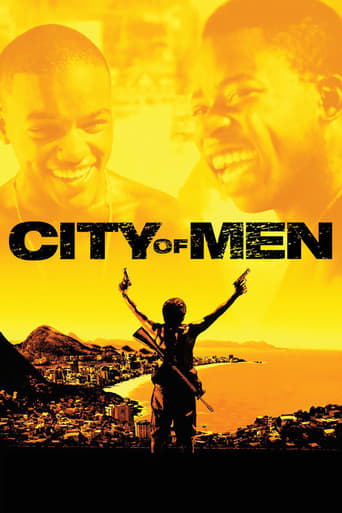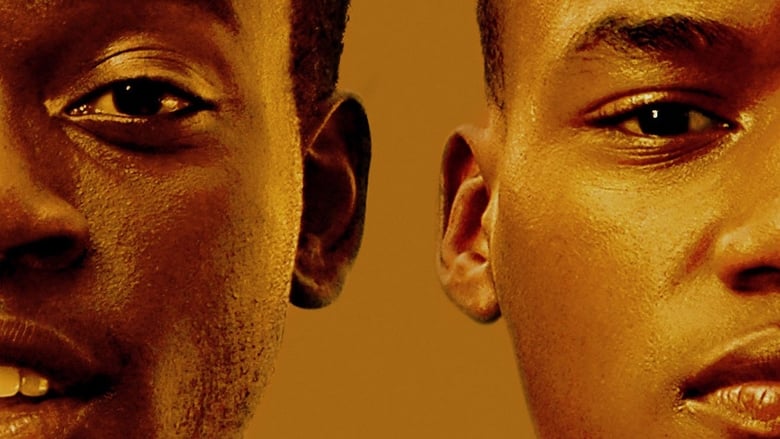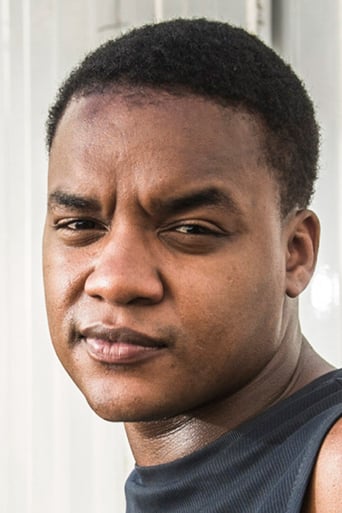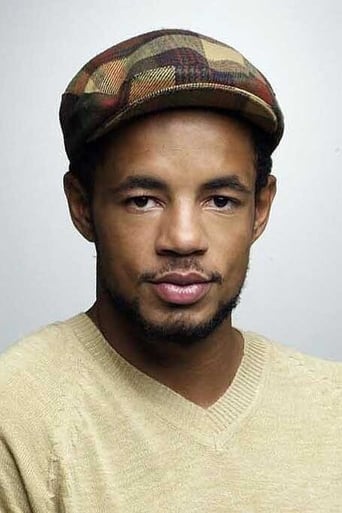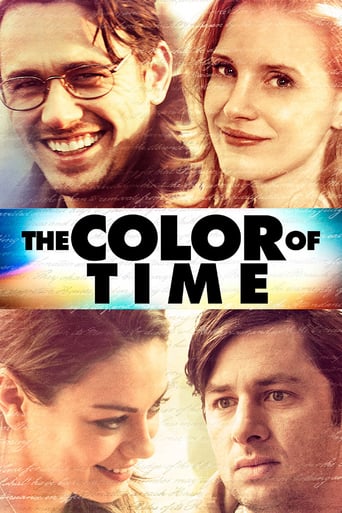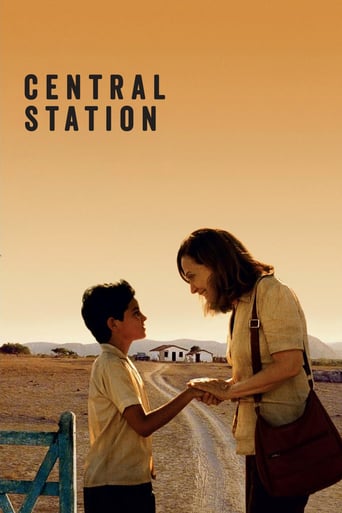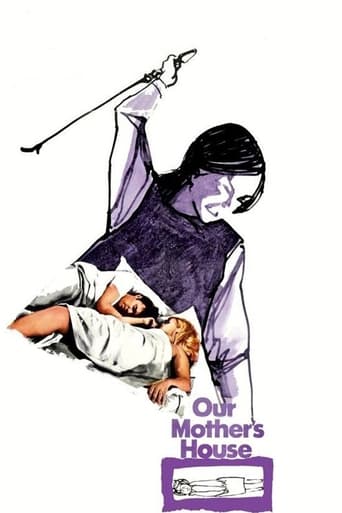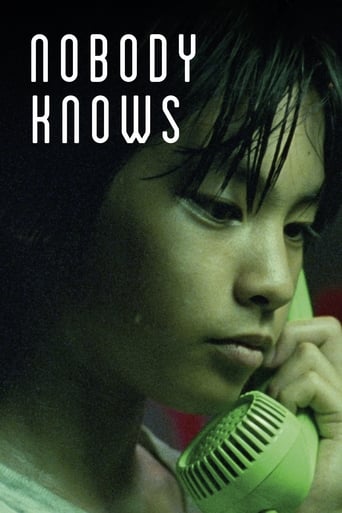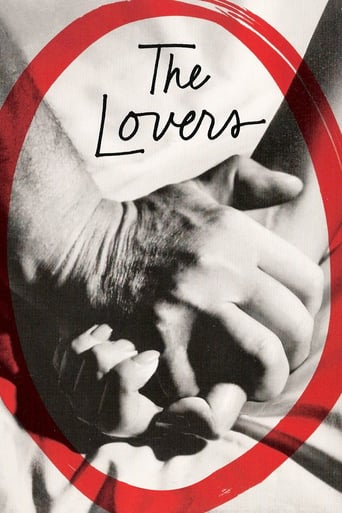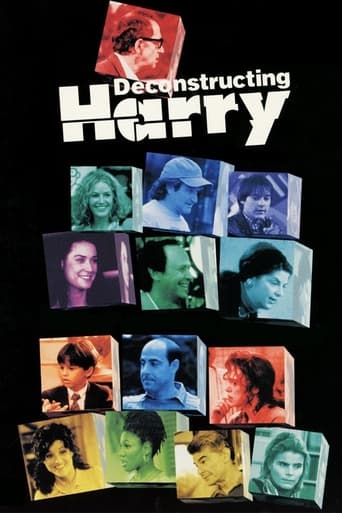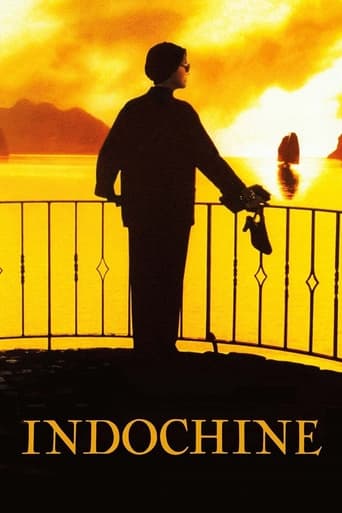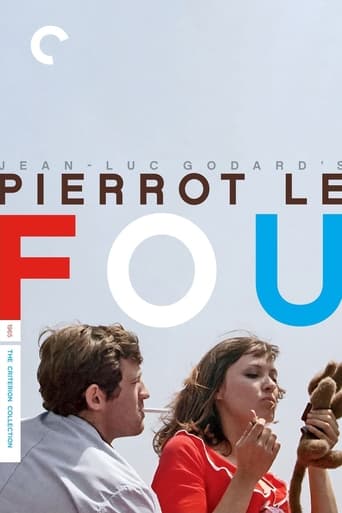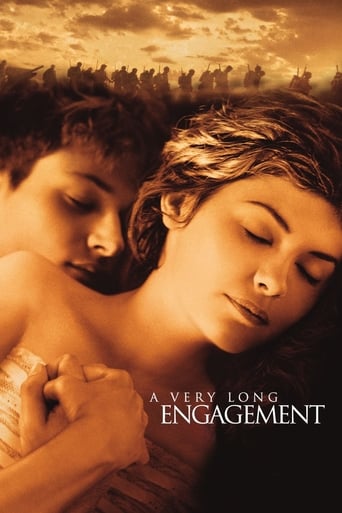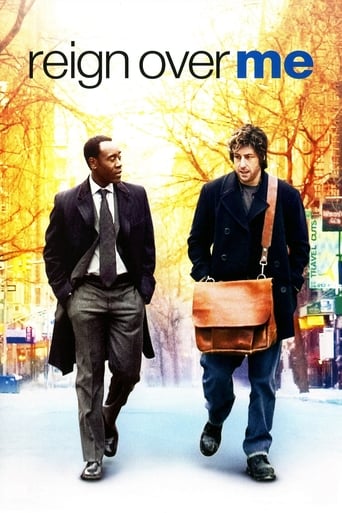City of Men (2007)
Best buddies Acerola and Laranjinha, about to turn 18, discover things about their missing fathers' pasts which will shatter their solid friendship, in the middle of a war between rival drug gangs from Rio's favelas.
Watch Trailer
Cast


Similar titles
Reviews
To me, this movie is perfection.
This movie is the proof that the world is becoming a sick and dumb place
Perfect cast and a good story
Great movie. Not sure what people expected but I found it highly entertaining.
At times this movie is very powerful and really makes the reality of Brazil's slums come alive. The characters struggle with broken families and shattered dreams, and join gangs because there are few other realistic options. Even though the film is fictional, it is sad to see because there is truth behind it.At other times the movie feels very ham-handed, as the characters deal with themes that have been in many movies before. Fathers who come back, sons who push against them. Most of the characters are not well-defined and lack depth and motivation.I would recommend the movie, but it is not as good as some other Brazilian films about life in the favelas, namely City of God.
'City of God' was a visceral epic, a tale of the slummification of a Brazillian new suburb and the consequences of this story for the lives of those who lived there. 'City of Men' is a loose sort of follow up, with a different director, and it's a lesser film, without Fernando Meirelles' scintillating direction. More than anything else, the story suffers because its protagonists are so clearly innocents caught up in events beyond their control; while it's still an effective portrayal of the harshness of life in the favella, it lacks the sense of individual responsibility that is usually a necessary part of the most powerful drama. Which is not to say that it's a bad film, making good use of the dramatic setting of Rio de Janeiro, and conveying well not just the brutality, but also the fragility, of a life lived at the margins.
Quite an interesting movie - filmed in an almost 'cinema-verite' style. It is extremely authentic. The slums (or favelas of Rio), the dialogue, the gang members, the innocent by-standers are all depicted with a reality, that if it were not for the poverty, grimness and violence, would be considered refreshing. From that point of view it is much like 'City of God' but less nihilistic and the focus in this movie only centers on Rio de Janeiro. There is a positive out-look in that both the central characters are concerned with fatherhood; one is already a father and both do not know their real fathers (although this changes during the film). This creates a counter-balance to the slum and gang warfare. It took me awhile to understand or pick up on the storyline one must pay close attention during the first 30-40 minutes to the characters and dialogue. I realized after, when I watched the DVD out-takes, that this was based on a TV series so that may be a reason for those difficulties.
This sepia-sunbleached feature derives from, and features the same main characters as, the eponymous 2002-2005 Brazilian TV series about (mostly) boys in the "favela" hill ghettos above Rio for which Morelli did some of the writing and directing. The series, starring Darlan Cunha as Laranjinha (Wallace) and Douglas Silva as Acerola (Ace) --growing up from year to year and episode to episode--sort of grew out of the Fernando Meirelles/Kátia Lund film, 'City of God,' which in turn was based on Paulo Lins' tumultuous and partly autobiographical novel about three decades in the slums and the involvement of youth as dealers, assassins, and victims. Actually the Ace/Wallace characters as young teenagers, always played by Silva and Cunha, predate 'City of God' by two years; they appeared in a short film called 'Palace II' in 2000. The history of these films and stories is as intricate as the world they depict. Douglas Silva was the prepubescent tough in 'City of God' known by he moniker Dadinho--Lil' Dice.'City of Men' is warmer and more intimate than the original film. 'City of God' has been both admired for its virtuosity--it's full of tours de force of visual violence and equally brilliant feats of rapid storytelling--and condemned as reveling too much in blood and gore, making teenage killers who terrorize neighborhoods into little glamor boys. That's quite true. It's unfortunately also true that in the ghettos of Rio as of other places such as the USA, young gun-toting drug dealers are the sexy local pop stars. Maybe the earlier film fails to take a sufficiently clear moral stand, or too much reflects the viewpoints of the young favela males it depicts. Nonetheless it's exhilarating film-making. Paradoxically, it also has a more positive arc than 'City of Men,' because its hero works his way out of the slums and into mainstream Rio de Janeiro to become a photojournalist. In 'City of Men,' nothing like that happens. Instead, there is a difficult reconciliation between the two boys, on the brink of eighteen, despite a stunning revelation about their lost fathers, and one of the fathers comes back into the picture and, reluctantly at first, chooses to be a warm presence in the life of his son. Both of the boys endure moments of terrible loneliness and isolation, which reveal how isolating the world of shifting and dangerous loyalties and hills fought for and lost is for a boy who in the first place lacks parents. But the focus is on the reconciliations.In the TV series, the boys are in school. They face difficulties even showing up, and only one of them, Ace (Silva) really hits the books (he's also fascinated by guns of all kinds). Laranjinha is closer to turning into a young hood.Thugh the new movie 'City of Men' is less specific than the TV series (judging by the DVD collections of episodes that I've seen) and suffers a bit by comparison with either it or 'City of God,' the vibrancy of the life on offer in all these films is still unmistakable, as well as the attractiveness of the young actors, the warmth of the world evoked--and vernacular swiftness that of the filming and editing, which somehow is both relaxing and unnerving.Wallace/Laranjinha is trying to find out who his real father is; he doesn't want "unknown" to be on the place for "father" on his papers. Acerola knows his father is dead, and he wants to know what happened. He's faced with the local problem from the other side. His wife Cris (Camila Monteiro) keeps leaving their toddler son Clayton (Vinicius Oliveira) with him to take care of. He doesn't want to accept the responsibility. But if he reneges on it, he'll leave Clayton in the same place he and Wallace are in. Ace abandons Clayton on the beach early on when Madrugadão (Midnight, Jonathan Haagensen), the gang leader of the hill where they live, risks assassination to descend on a super-hot day for a swim in the ocean. He also turns some flashy cartwheels and shows off his spectacular pecs. Madrugadão, like Wallace (i.e. Darlan Cunha), is handsome and charismatic. Ace is so childish he forgets his own son; but he rushes back and finds him. And when Cris gets a job in the wealthier city of São Paulo, Ace, with great difficulty, forces himself to take on the responsibility of raising Clayton.Wallace (perhaps a bit too easily) finds his father, a bearded man named Heraldo (Rodrigo dos Santos), who has just gotten out of prison after serving fifteen years of a twenty-year sentence--for murder. Heraldo's beard cannot conceal the fact that he is not very mature. He hasn't shouldered the responsibilities of being a man. But he also carries the weight of suffering and gratitude.When rival gang leader Fasto (Eduardo "BR" Piranha) takes over Midnight's territory on Dead End Hill, a new gang war breaks out right in the middle of Ace and Wallace's journey of self-discovery.'City of Men' is a more tender, individual and grownup story than 'City of God'; from what I've seen of the TV series it grows out of, it's less specific and less witty. It works as a kind of antidote to the amorality one feels in 'City of God,' and its warmth is touching. Nor is it visually ineffective, or its sense of the milieu less rich--except. Except that it quite lacks the momentum and adrenaline-rush brilliance of 'City of God's' virtuoso film-making and editing, or the rich range of minor characters the latter has. It is a little bit meandering, and its fast jump-cut slides from scene to scene sometimes seem out of place. As the AV Club reviewer says, much has been gained in this new film, but much has been lost as well. Still 'City of Men' is well worth watching.

